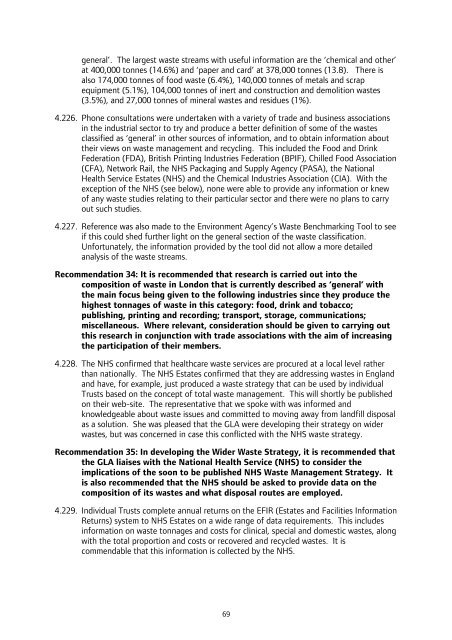London Wider Waste Strategy - London - Greater London Authority
London Wider Waste Strategy - London - Greater London Authority
London Wider Waste Strategy - London - Greater London Authority
You also want an ePaper? Increase the reach of your titles
YUMPU automatically turns print PDFs into web optimized ePapers that Google loves.
general’. The largest waste streams with useful information are the ‘chemical and other’<br />
at 400,000 tonnes (14.6%) and ‘paper and card’ at 378,000 tonnes (13.8). There is<br />
also 174,000 tonnes of food waste (6.4%), 140,000 tonnes of metals and scrap<br />
equipment (5.1%), 104,000 tonnes of inert and construction and demolition wastes<br />
(3.5%), and 27,000 tonnes of mineral wastes and residues (1%).<br />
4.226. Phone consultations were undertaken with a variety of trade and business associations<br />
in the industrial sector to try and produce a better definition of some of the wastes<br />
classified as ‘general’ in other sources of information, and to obtain information about<br />
their views on waste management and recycling. This included the Food and Drink<br />
Federation (FDA), British Printing Industries Federation (BPIF), Chilled Food Association<br />
(CFA), Network Rail, the NHS Packaging and Supply Agency (PASA), the National<br />
Health Service Estates (NHS) and the Chemical Industries Association (CIA). With the<br />
exception of the NHS (see below), none were able to provide any information or knew<br />
of any waste studies relating to their particular sector and there were no plans to carry<br />
out such studies.<br />
4.227. Reference was also made to the Environment Agency’s <strong>Waste</strong> Benchmarking Tool to see<br />
if this could shed further light on the general section of the waste classification.<br />
Unfortunately, the information provided by the tool did not allow a more detailed<br />
analysis of the waste streams.<br />
Recommendation 34: It is recommended that research is carried out into the<br />
composition of waste in <strong>London</strong> that is currently described as ‘general’ with<br />
the main focus being given to the following industries since they produce the<br />
highest tonnages of waste in this category: food, drink and tobacco;<br />
publishing, printing and recording; transport, storage, communications;<br />
miscellaneous. Where relevant, consideration should be given to carrying out<br />
this research in conjunction with trade associations with the aim of increasing<br />
the participation of their members.<br />
4.228. The NHS confirmed that healthcare waste services are procured at a local level rather<br />
than nationally. The NHS Estates confirmed that they are addressing wastes in England<br />
and have, for example, just produced a waste strategy that can be used by individual<br />
Trusts based on the concept of total waste management. This will shortly be published<br />
on their web-site. The representative that we spoke with was informed and<br />
knowledgeable about waste issues and committed to moving away from landfill disposal<br />
as a solution. She was pleased that the GLA were developing their strategy on wider<br />
wastes, but was concerned in case this conflicted with the NHS waste strategy.<br />
Recommendation 35: In developing the <strong>Wider</strong> <strong>Waste</strong> <strong>Strategy</strong>, it is recommended that<br />
the GLA liaises with the National Health Service (NHS) to consider the<br />
implications of the soon to be published NHS <strong>Waste</strong> Management <strong>Strategy</strong>. It<br />
is also recommended that the NHS should be asked to provide data on the<br />
composition of its wastes and what disposal routes are employed.<br />
4.229. Individual Trusts complete annual returns on the EFIR (Estates and Facilities Information<br />
Returns) system to NHS Estates on a wide range of data requirements. This includes<br />
information on waste tonnages and costs for clinical, special and domestic wastes, along<br />
with the total proportion and costs or recovered and recycled wastes. It is<br />
commendable that this information is collected by the NHS.<br />
69
















